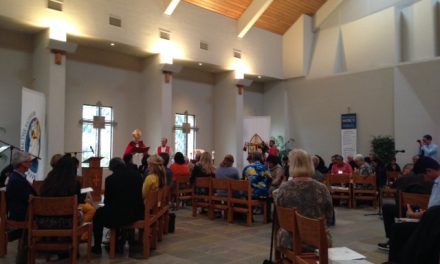I hope that title got your attention. I also hope that we can laugh about it a little, and also talk about how serious it is.
I found myself today fondly recalling the hilarious description in Growing Up Catholic of the moral perils of going to the ballpark on a Friday. The authors walk through the incident in hilarious detail about what might be mortal sin and what is probably just venial sin. I don’t have the text in front of me, but I remember that eating the first half of the hot dog is a venial sin, and forgetting it was Friday was probably a venial sin. But then you find yourself in a situation of (having remembered it’s Friday with half a hot dog in your hand) knowingly and willingly wasting food or knowingly eating meat on Friday. Probably mortal sin either way. If I remember rightly, the moral of the story was to stay out of the ballpark on Friday.
I’m remembering this story because I’m starting to wish I could just stay out of the voting booth come November. I’m also remembering it because this video certainly makes it clear that if you vote the wrong way, your soul is on the line. I wish I were clever enough to do it here and now, but somewhere there is a brilliant piece to be written that both accurately and hilariously reflects the reality that you can vote for the wrong candidate for the wrong reasons, the wrong candidate for the right reasons, the right candidate for the wrong reasons, or the right candidate for the right reasons. Three of the four of those have a chance of landing you in hell. You might also refuse to vote for the right or wrong reasons. There’s also some chance that all of the candidates available are the wrong candidate AND it’s wrong not to vote, in which case, we’re all going to hell. (Or at least to confession.)
Catholic social thought and the US Bishops make it pretty clear that we Catholics have a positive obligation to participate in political life in service of the Church’s mission and the common good. Drawing from Gaudium et Spes, they point out that the Church (the Magisterium, the clergy, the religious, the lay faithful) must, because of the nature of our faith and the mission given to us, take a proactive role in shaping the world that we live in:
The Church’s obligation to participate in shaping the moral character of society is a requirement of our faith. It is a basic part of the mission we have received from Jesus Christ, who offers a vision of life revealed to us in Sacred Scripture and Tradition. To echo the teaching of the Second Vatican Council: Christ, the Word made flesh, in showing us the Father’s love, also shows us what it truly means to be human (see Gaudium et Spes, no. 22). Christ’s love for us lets us see our human dignity in full clarity and compels us to love our neighbors as he has loved us. Christ, the Teacher, shows us what is true and good, that is, what is in accord with our human nature as free, intelligent beings created in God’s image and likeness and endowed by the Creator with dignity and rights.
Although the bishops never quite say that we’re going to hell if we vote for the wrong candidate, they clearly think that a lot is at stake not only in terms of what is good for all people but also in terms of what is good morally for all people participating in this election. When Grant Gallicho posted the video linked above on dotCommonweal, he simply linked the video and asked the question, “Why would anyone think the bishops’ religious freedom campaign could serve partisan ends?”
It’s a fair question. But when we look at the whole list of goals for which the Bishops ask Catholics (and persons of good will) to be working, it is more complicated. I admit that if you see the whole list as articulated in FCFC #90, it starts with opposition to abortion, seeks protection of life at every stage, and includes protection of traditional marriage. But look what it goes on to list:
- Help families and children overcome poverty: ensuring access to and choice in education, as well as decent work at fair, living wages and adequate assistance for the vulnerable in our nation, while also helping to overcome widespread hunger and poverty around the world, especially in the areas of development assistance, debt relief, and international trade.
- Provide health care for the growing number of people without it, while respecting human life, human dignity, and religious freedom in our health care system.
- Continue to oppose policies that reflect prejudice, hostility toward immigrants, religious bigotry, and other forms of discrimination.
- Encourage families, community groups, economic structures, and government to work together to overcome poverty, pursue the common good, and care for creation, with full respect for religious groups and their right to address social needs in accord with their basic moral convictions.
- Establish and comply with moral limits on the use of military force—examining for what purposes it may be used, under what authority, and at what human cost—and work for a “responsible transition” to end the war in Iraq.
- Join with others around the world to pursue peace, protect human rights and religious liberty, and advance economic justice and care for creation.
These goals transcend partisan lines. And yet we Catholics keep working pretty hard to support the party whose compromise we like best, who seems to do best with regards to our own favorite issues. What would happen if, instead of compromising with the political parties we are made to choose from, we started compromising a bit with one another and finding the common ground among us? Maybe we can come up with some options that will keep us all out of hell, and maybe even make the world a better place.




” There’s also some chance that all of the candidates available are the wrong candidate AND it’s wrong not to vote, in which case, we’re all going to hell.”
You forgot the Lutheran approach: The very idea that you could find the right person to vote for and the right reasons for doing it is a sin, so you just need to go in the voting booth and do your duty, and trust that God’s mercy will save you.